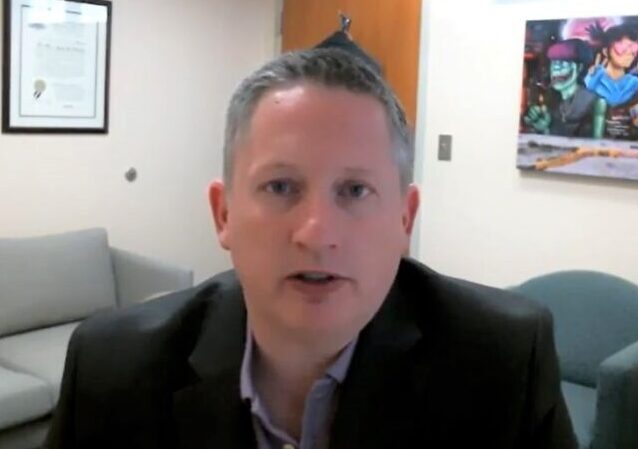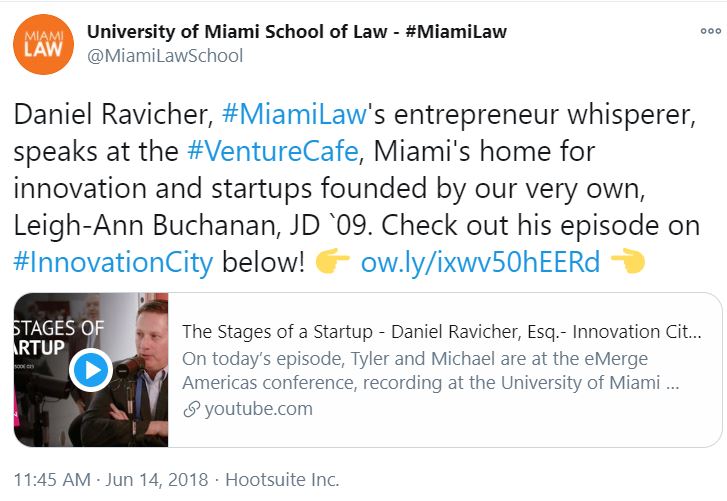U. Miami Law Prof Daniel Ravicher says threatened with termination after pro-Trump tweets

Daniel Ravicher is a star on the University of Miami Law School faculty. A full time lecturer, he currently is appointed under a 3-year term ending in June 2022.
Ravicher is Director of U. Miami Law’s Startup Practicum, which he helped launch:
Ravicher and the StartUp Practicum have received enormous media attention and promotion by the law school.
The law school repeatedly has praised Ravicher’s work, pointing out the positive impact he has had on student experience. Ravicher’s work with students also received national media attention.
The law school even referred to Ravicher as the ‘entrepreneur whisperer‘:
Ravicher even was featured on the law school podcast about the possible sale of TicTok.
In an all-to-familiar tale of 2020 ‘cancel culture,’ Ravicher found himself the target of students who objected to his pro-Trump and election tweets. We covered the story back on November 8, 2020, quoting reporting by the student-run The Miami Hurricane newspaper:
With the result of the presidential election between President Donald Trump and Democratic Nominee Joe Biden still not final, University of Miami School of Law professor Daniel Ravicher began tweeting his views on Twitter in support of Trump, which included accusing the Democrats of cheating by deliberately stopping votes.Ravicher also expressed his opinion about cheating in the American election process: “Cheating in politics is as American as apple pie. If you’re good enough to get away with it you deserve to win. That’s how it always been and how it always will be.”At UM, Ravicher is a lecturer in the law school and is the director of the Startup Practicum, which provides students with the opportunity to provide legal assistance to new business ventures.At UM, Ravicher is a lecturer in the law school and is the director of the Startup Practicum, which provides students with the opportunity to provide legal assistance to new business ventures.On Wednesday, Ravicher also discussed racial minorities and their party alignment….As these tweets began to spread amongst undergraduate and law students, one Black undergraduate student who was considering remaining at UM for law school said that now it is completely out of the picture.“Never did I ever imagine such disgusting rhetoric would come from a professor at UM Law,” said junior Charis Pitter, who hopes to serve as a lawyer for marginalized communities. “As a UM student, I’m disappointed, angry, but not surprised because the way the UM administration has handled hate speech during this election season shows their true colors. I came here because UM always preached diversity and acceptance, but I no longer feel like I’m at an institution that values me.”Raven Bedford, a junior psychology major who is also Black, said having a professor perpetuating what she alleges as extremist views with racist undertones teaching students sets a dangerous precedent as she said she fears such views could wind up in the classroom.“He seems extremely racist, radical and dangerous and, at the very least, he follows others on social media who most would consider unhinged and extremist in their views,” said Bedford. “This man’s tweets have violent and racist undertones. I can’t imagine those views don’t leak into the classroom when he teaches. As a Black student, I don’t feel or welcome on a campus where professors advocate for my dehumanization on Twitter, and I can only imagine how the Black students in his classes feel.”
Here are the tweets referenced in the Miami Hurricane story as having set off student anger:
On November 6, Ravicher was denounced by the Dean of the law school, Tony Varona, who defended Ravicher’s academic freedom to make such statements while also declaring the statements contrary to law school values (sound familiar?)
In a follow up to the Dean’s message, a Vice Dean offered StartUp Law students the option of taking the course pass/fail because of the tweets, for those students who were “uncomfortable” and concerned with impartial grading. Ravicher strongly objected to such insinuations:
Also, at some point I’d appreciate understanding the process for how a decision is made that a professor has saidsomething that calls into question the integrity of their grading. I assume it’s a subjective decision byadministrators, all of whom are liberals/Democrats. If a Republican, Muslim, or Catholic student is offended bythings their professors say, and they report it, can they too be offered the pass/fail option, or does it have to be acertain number of students? Or is it only if black students complain about racism that this is a potential resolution?I’ve alleged that subjective standards are arbitrarily applied to conservatives, but I’d love to be disproven. Is thereany history of this practice being implemented against any other professor? …
Over 250 students have signed a Change.org Petition started by the U. Miami Law GOP student group supporting Ravicher:
As law students, we are taught about the Constitution and freedom of speech. Evidently, some speech is freer than others, as is perhaps the view held by some students at the University of Miami School of Law. Law students are reporting esteemed Professor Dan Ravicher to the law school administration, strictly on the basis of a political disagreement. Nobody’s political views should be used against them in a job, especially not an academic job. Diversity of thought is critical in an educational institution, which is said to be a melting pot of ideas. We must ensure that the University of Miami School of Law does not take action against Professor Ravicher strictly on the basis of his political views. Professor Ravicher is a voice for students on the law school campus who often feel voiceless. He is not only a well-respected attorney, but also a man of great character. This petition signifies support for both Professor Ravicher at Miami Law and diversity of thought in academia.
In another all-too-familiar move, numerous fellow faculty members issued a group denunciation of Ravicher in the student newspaper (with a separate Google doc gathering more signatures), defending their own right to criticize him, yet ignoring the chilling effect a collective pile-on has. The letter reads in part:
These public social media posts demonstrate, at the very least, an egregious lack of professional judgment. While Ravicher’s unprofessional behavior may be defended as a matter of academic freedom or free speech, academic and free speech norms do not insulate lawyers from critique. To the contrary, the principles of academic freedom and free speech compel us to speak out against Ravicher’s promotion of disinformation, invocation of violence, and racially derogatory commentary. We join the students, alumni, and practicing attorneys voicing concern that these statements potentially reflect deeper failings.
As of this writing, the signatories on the Google Doc are:
Anthony Alfieri, Professor of Law
Caroline Bettinger-Lopez, Professor of Law and Director, Human Rights Clinic
Michael Chiorazzi, Associate Dean for Information Resources, Librarian Professor, Dean’s Distinguished Director
Caroline Mala Corbin, Professor of Law & Dean’s Distinguished Scholar
Andrew B Dawson, Professor of Law & Judge A. Jay Cristol Chair in Bankruptcy Law
Andrew Elmore, Associate Professor of Law
Mary Anne Franks, Professor of Law & Dean’s Distinguished Scholar
Frances R. Hill, Professor of Law & Dean’s Distinguished Scholar for the Profession
Elizabeth M. Iglesias, Professor of Law
Osamudia James, Professor of Law & Dean’s Distinguished Scholar
Tamara Lave, Professor of Law
JoNel Newman, Professor of Law
Jessica Owley, Professor of Law
Kunal Parker, Professor of Law and Dean’s Distinguished Scholar
Bernard Perlmutter, Professor of Law
Ileana Porras, Senior Lecturer
Pablo Rueda-Saiz, Associate Professor of Law
Stephen J. Schnably, Professor of Law
Becky Sharpless, Professor of Law
Kele Stewart, Professor of Law
Irwin P. Stotzky, Professor of Law
Scott Sundby, Professor of Law & Dean’s Distinguished Scholar
Craig J. Trocino, Director, Miami Law Innocence Clinic
Teresa J. Verges, Director, Investor Rights Clinic and Lecturer in Law
Kira E. Willig, Adjunct Professor
I emailed each of them asking for comment, but received no substantive responses. (The only person who responded said she was very busy today, and I should refer questions to the Dean).
Ravicher did not back down to the pressure from students, the administration, and faculty:
Earlier today Ravicher tweeted:
I’ve been fired because I refuse to censor my speech and apologize, in addition to satisfying other yet to be defined requirements. The only uncertainty is when my last day will be, either the end of my contract or sooner if the school can fabricate a performance related reason.
In an email, Ravicher expanded on that “firing”:
The Dean and I spoke on Saturday and he said if I didn’t retract my statements and apologize, at minimum my contract would not be renewed, and something could happen even sooner once he consults with central and GC. I told him I would not retract any statement and that I do not apologize for them. He also said [if] I were black, nothing I said would be controversial. It’s because I’m white and a man that this has become an issue.
It’s not clear that Ravicher will be fired, though that is how he construes the communications. The Dean did not respond to my multiple emails seeking clarification and comment.
But the damage is done. The chilling effect of making an example of a professor with wrongthink and holding him out for scorn and public shaming has been set. Others will now remain silent to avoid that treatment. This case ‘passes’ the test for being considered cancel culture.
Ravicher indicated on Twitter that he may be on Laura Ingraham tonight. If so, we will add the video.
We will continue to follow this dispute.
UPDATE:
Ravicher appeared on the Laura Ingraham Show. *Someone* made a cameo appearance.
CLICK HERE FOR FULL VERSION OF THIS STORY


